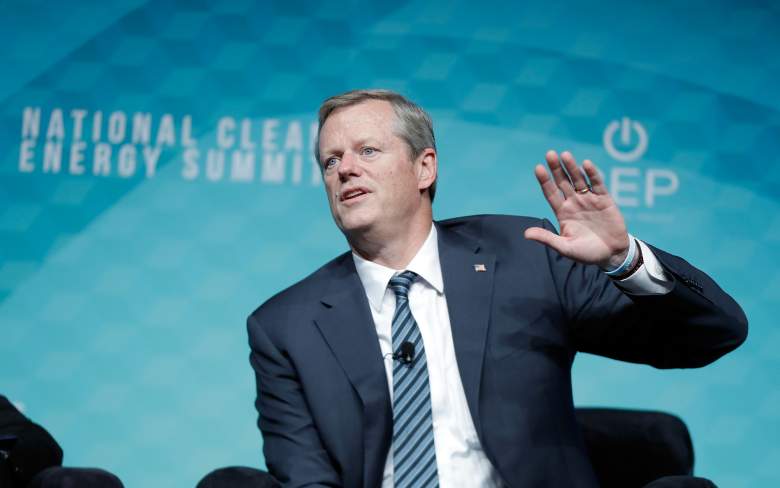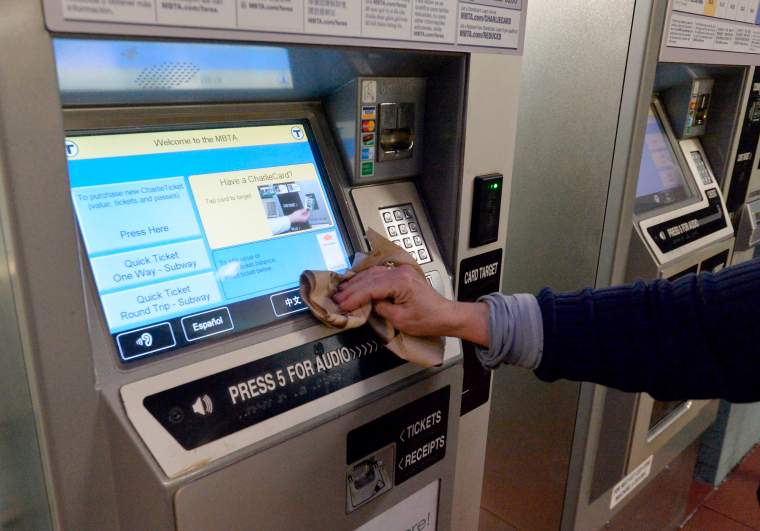
Photo by Isaac Brekken/Getty Images for National Clean Energy Summit Massachusetts Governor Charlie Baker speaks at an event in October
Massachusetts declared a “state of emergency” on Tuesday after the number of presumptively positive and confirmed cases of the COVID-19 coronavirus more than doubled overnight bringing the total to 92 cases in the Commonwealth of Massachusetts, Governor Charlie Baker announced at press conference Tuesday afternoon.
Health officials at the press conference said that, because the tests for the disease involve multiple steps, they have to continue to use the technical term “presumptive positive” when discussing them but they said they have “complete confidence” that these cases will eventually be formally confirmed as COVID-19 once the samples are re-tested by the federal Centers for Disease Control.
As of Monday afternoon there had been 41 cases in Massachusetts with only one of those cases having been officially confirmed by the Centers of Disease control.
The governor said the “significant uptick” in the total brought on by the announcement of 51 new presumed cases on Tuesday prompted him to “act before the numbers increase…so it doesn’t spike all at once, so it doesn’t overwhelm our systems.”
Currently, out of the total number of cases identified in Massachusetts only six individuals are hospitalized. The others are in home quarantine either monitoring themselves or further symptoms or, in the case of the very first patient, reportedly recovering well.
Governor Baker said the main point of the emergency declaration was to give him the power to quickly make decisions and issue orders designed to mitigate the impact of the spread of the disease which is almost certain to get worse before it gets better.
The governor said that while the coming days and weeks will likely involve considerable disruption to at least some citizens’ lives in Massachusetts the hope is to “avoid spiking all at once, which would have a far greater impact” than a more paced out spread of the virus.

Photo by JOSEPH PREZIOSO/AFP via Getty ImagesA Massachusetts Bay Transportation Authority employee (MBTA) cleans ticket machines in an effort by the MBTA to stop the spread of the coronavirus, COVID-19, in Boston, Massachusetts on March 7, 2020. The MBTA announced they will be cleaning all “high contact surfaces” every four hours.
So far the majority of cases in Massachusetts, three-quarters of the total, can be traced to an employee conference held by the biopharmaceutical company Biogen which was held during several days in late February at the Marriott Long Wharf Hotel in Boston’s Seaport District.
During Tuesday’s press conference health officials said that 70 of the 92 cases currently being tracked in Massachusetts were “related to Biogen employees or their close contacts.” Four of the non-Biogen cases are “travel related” and the remaining 18 are still under investigation.
While the majority of cases are still centered around Middlesex County (41 cases), Norfolk County (22 cases), and Suffolk County (20 cases), it was the addition of 7 new cases in Berkshire County clear over on Massachusett’s western border with New York state that helped prompt the decision to make Tuesday’s state of emergency declaration. “For the first time, we have cases in Berkshire County that we can’t trace back to an individual,” Governor Baker explained.
Governor Baker said that while “We think large gatherings are probably not a great idea” at this point the state is leaving it to private venue operators and major sports leagues to consider whether sports games and other entertainment events go forward on a case-by-case basis; however, he added that he is immediately cancelling all work-related travel, both foreign and domestic, for Massachusetts Executive Branch employees. The Executive Branch is also discontinuing large gathering and meetings for the approximately 42,000 state employees under the direct jurisdiction of the Governor’s Office and encouraging them to use remote-work methods such as conference calls and telecommuting wherever possible. That order does not apply directly to either state’s higher education employees or the judicial system which are not controlled by the executive branch.
READ NEXT: Boston Cancels St. Patrick’s Day Parade Due to Coronavirus Concerns
